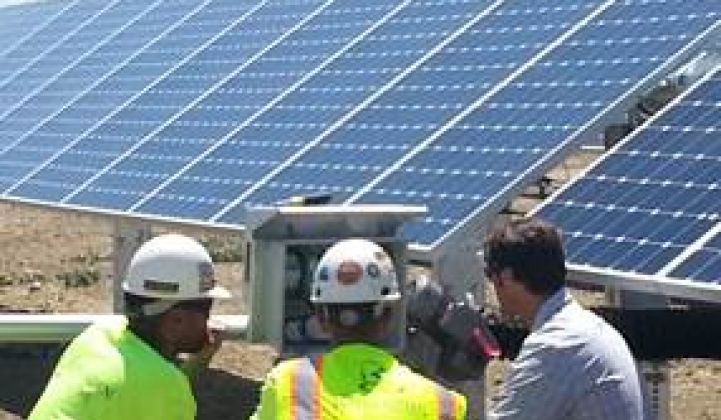Distributed Sun’s just-launched prototype version of beEdison is an online tool designed to make it faster and easier for investors to find worthy solar projects and for developers to find interested investors.
The beEdison software allows project sellers to enter survey data covering some 600 points about proposed projects. The predictive and directive scoring, which incorporates a recommendation engine, helps developers learn the language of finance. Investors can study the resulting beEdison diligence report to focus on projects that suit their aims and to identify the information still needed to make investment decisions.
The beEdison diligence and risk tool was developed from Distributed Sun’s study of 700-plus project development deals totaling nearly $7 billion in value, as well as the DuPont-and Distributed Sun-driven truSolar industry-wide project risk assessment database.
With beEdison, the company is separating the software, data, and intellectual property on which its diligence and project underwriting services are based from its project development and owner-operator activities. It is funded with $2 million from Distributed Sun and unidentified new investors.
The goal is to get into a transaction services marketplace that Distributed Sun estimates will be worth over $600 million for U.S. non-residential solar by 2018.
“In every deal we do, we pay for all the deals we didn’t do or dropped,” explained Distributed Sun CEO Chase Weir. “We also pay the hidden costs for all the deals our counterparties didn’t do. We could have known which projects were not worth doing sooner if we were asking the right questions in the right way at the right time.”
Based on Distributed Sun’s in-house assessment of a 100-megawatt sample of projects, 70 percent of proposed transactions have “one or more fatal flaws that cost money to find and/or fix,” Weir said.
An NREL assessment of soft costs shows there are 63 cents per watt in transaction costs and margins burdened by sunk costs, Weir said. But if all the deal parties used beEdison, that could be cut by 7 cents per watt. “That would cut $115 million from projects to be placed in service in 2014. It could cut $200 million from all currently proposed projects in the development pipeline.”
BeEdison is being designed to provide the best possible online project due diligence. It is a “TurboTax” of project stress for developers and project originators, Weir said, and it automates the screening and stress-testing of deal elements for investors.
Because the software incorporates the industry-wide truSolar effort to accumulate data on project risk, the industry itself is the final voice of whether there is risk, Weir said.
Six users are participating in the prototype testing, including two developers, two investors, and two institutions that put money into solar but aren’t ready to change their diligence process. All are participating without cost under end-user license agreements.
The long-term revenue plan is based on the "freemium" business strategy. The open platform will be cost-free until the parties hit certain value points. “We are focused on the art and science of adoption,” Weir explained. The parties will pay “when the deal gets real and user benefit is plain. But we get out of the way and let the deal get done. We are less interested in processing lots of potential deals than in getting deals over the goal line," Weir said.
Unlike the Mercatus online digital deal room just endorsed by SolarCity, beEdison aims to be “the next-generation risk and diligence practice,” Weir said. He hopes to create an open, industry-driven scoring platform that is a training system for developers, and that increases deal transparency and lowers risk and cost for developers.
As indicated by recent SunShot awardees, the industry is hungry for financial technologies that cut the soft costs of deal-making, Weir said. Mercatus and truSolar, as well as Richard Matsui’s kWh Analytics, are “educating the marketplace that we need better tools to evaluate project risk.”
A Power User version of beEdison will come this summer. Weir expects it to have a dozen users. An Enterprise version is scheduled for release this fall.
With new money coming in and the solar market reaching a higher level of maturity, Weir said, “people who want high-volume asset financing or selling will need financial technologies to help them more efficiently decide if a project is worth doing.”



